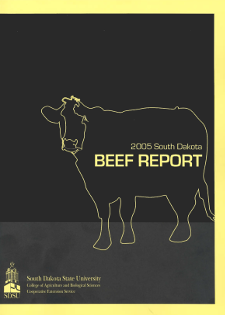Document Type
Report
Report Number
2005-24
Publication Date
2005
Keywords
oculation, estrous detection, beef cattle, beef heifers
Summary
The ability to successfully artificially inseminate cattle requires determining the appropriate time to inseminate. Therefore, detection of standing estrus is a major factor in the success or failure of most artificial insemination programs. The objective of these experiments was to determine the efficiency and accuracy of three estrous detection methods (visual, penile deviated bull, and Estrus Alert estrous detection aids) to determine if animals were going to ovulate. Fifty-three postpartum beef cows were synchronized with an injection of gonadotropin releasing hormone (GnRH) followed by an injection of prostaglandin F2_ (PG) seven days later. Estrus was monitored for 72 hours following the PG injection by visual estrus detection and Estrus Alert estrous detection aids. Thirty-seven beef heifers were synchronized with an injection of GnRH and insertion of a Controlled Internal Drug Releasing (CIDR) device on day 0. On day 7 an injection of PG was administered and the CIDR was removed from half the heifers on day 7 and the remaining heifers on day 14. Estrus was monitored for 5 days following CIDR removal by visual estrus detection, a penile deviated bull, and the Estrus Alert estrous detection aids. Ovulation was determined in all animals by transrectal ultrasonography between 48 and 96 hours after the onset of standing estrus. The percentage of animals detected in standing estrus and the percentage correctly identified as going to ovulate was similar (P > 0.78) among all three methods. In summary, intensive visual estrus detection, a marker animal, or proper use of estrous detection aids can correctly identify the majority of animals that will ovulate.
Number of Pages
6
Format
application/pdf
Language
en
Publisher
South Dakota State University
Rights
Copyright © 2005 South Dakota State University
Recommended Citation
Perry, George A., "Comparison of the Efficiency and Accuracy of Three Estrous Detection Methods to Indicate Ovulation in Beef Cattle" (2005). South Dakota Beef Report, 2005. 25.
https://openprairie.sdstate.edu/sd_beefreport_2005/25

